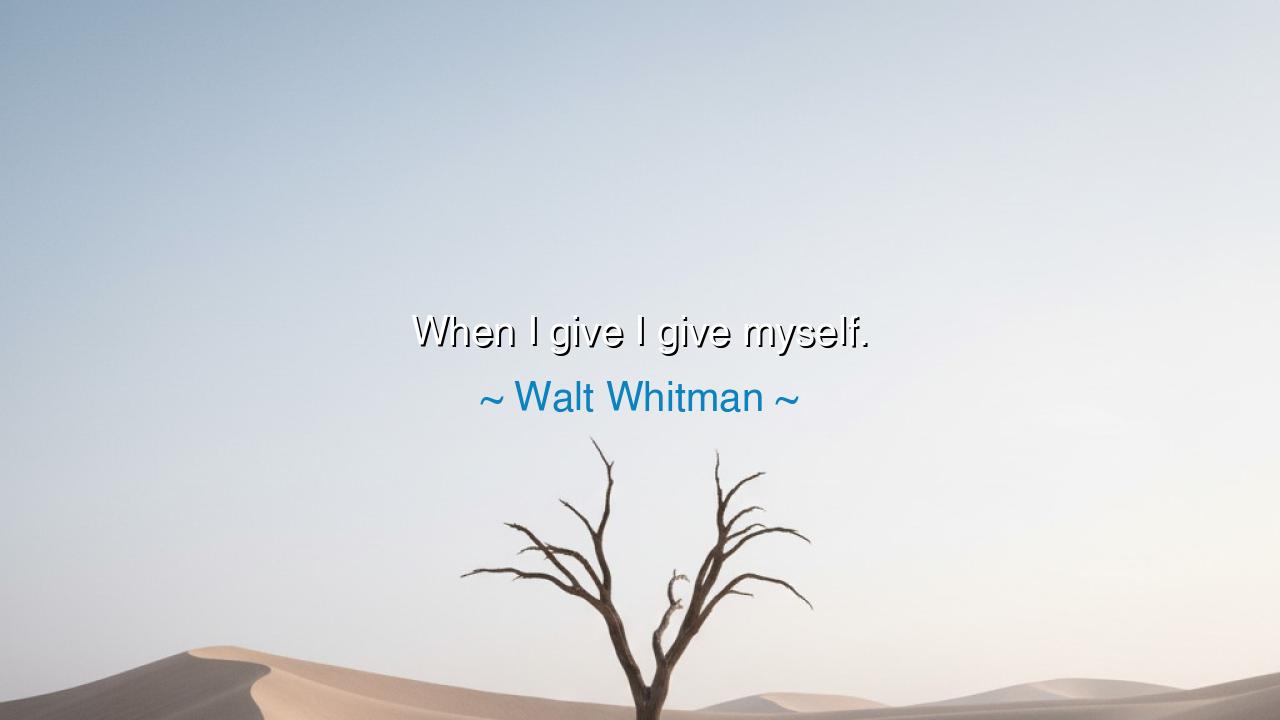
When I give I give myself.






The poet Walt Whitman, in his immortal cry, declared: “When I give I give myself.” These words, simple yet vast, contain the essence of true generosity. For Whitman, giving was not the shallow offering of coin or bread alone, but the surrender of one’s spirit, time, and essence to another. He recognized that the truest gift is not measured in weight or currency, but in the presence of the heart, in the breath of the soul poured into another’s life. To give one’s self is to say: “Here, take of my being, my strength, my love, my understanding, and let it nourish you as bread nourishes the body.”
In the olden days, many believed that power lay in wealth, in land, in armies. Yet the ancients knew a deeper truth: the one who gives of himself is greater than kings. Recall the story of Leonidas of Sparta, who at the pass of Thermopylae did not merely give shields and swords to his men—he gave his very life. Standing against thousands, his final act was not the gift of objects, but the offering of his spirit to inspire Greece. His sacrifice lives longer than all the gold of Xerxes, because it was the gift of the self, unmeasured, unbreakable.
When Whitman spoke these words, he reflected the soul of democracy and of brotherhood. He lived during a time when America was torn and bloodied by division, and he spent his days not only writing but also tending to the wounded in the Civil War hospitals. He gave no riches, for he had few. Instead, he gave his presence, his comfort, his poetry, his listening ear. Soldiers dying far from home clutched his hand, and in those moments, he gave them more than medicine—he gave himself. His words thus rise from the soil of lived compassion, not from idle philosophy.
To give oneself is no easy task. It requires vulnerability, for the self is sacred, and to place it into another’s hands risks pain, rejection, even betrayal. Yet it is only in such risk that love takes root. Think of a mother who rises in the dark hours of night, weary and heavy, yet gives herself wholly to her infant’s cry. She does not give from abundance, but from exhaustion; yet the child thrives, not on milk alone, but on the unseen warmth of her sacrifice. Such is the hidden majesty of Whitman’s phrase.
There is a rhythm in life: to hoard is to decay, to give is to flourish. The river that flows gives itself to fields, to villages, to the sea, and in its giving, it renews the earth. So too, when we give ourselves, we flow into the lives of others and become part of something eternal. Those who clutch only for themselves become stagnant pools, breeding only bitterness and emptiness. But those who open, who share of their time, their wisdom, their love, find themselves multiplied in the hearts they touch.
Let the lesson be clear, O listener: when you seek to give, ask not, “What objects can I spare?” but rather, “What of my being can I share?” Give your time to a friend in sorrow. Give your patience to a child in wonder. Give your forgiveness to one who has erred. These are not things purchased in markets—they are fragments of your very soul, and in giving them, you fulfill Whitman’s command.
Therefore, the call of Whitman’s voice across the ages is this: do not fear to spend yourself, for the self is not diminished by giving but enlarged. When you give yourself, you join the great current of humanity, the song of brotherhood, the eternal chain of hearts bound together. And in the end, what remains of us? Not our possessions, not our titles, but the measure of how deeply we dared to give ourselves away.
Live then with courage. Give not scraps, but the fullness of your being. Walk the earth as Whitman walked, as soldier, nurse, poet, and brother to all. And when you give, remember: “When I give I give myself”—and in that giving, you become immortal.






AAdministratorAdministrator
Welcome, honored guests. Please leave a comment, we will respond soon